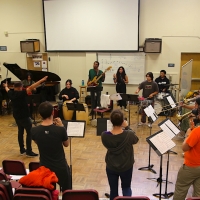Teaching Musicians To Write Scores For Video Games
For the year-end project of San Francisco State University’s video game composition class, the assignment was to help players find their way out of a hedge maze. The only clues revealing the correct path to the exit were of the musical variety. A wrong turn might result in a dissonant clash of violin harmonies, while a correct decision shifted the tone to an uplifting melody that sounded like something from a Danny Elfman soundtrack.
“Movie music is very linear, it goes from point A to point B, from the beginning to the end,” says 23-year-old Sydney Roberts, who commutes two hours from Livermore. “Video game music gives the illusion of linear music, but it’s very non-linear. The music follows what the player does, not what the story does.”
The hedge maze was an example of the unique functional challenges presented by music in games, which has in turn spawned a cottage industry of composers and sound designers hoping to find the professional musician’s holy grail: steady employment.
The SFSU course teaches young musicians about one of the most viable career paths in a profession that’s becoming less and less viable, especially in San Francisco. In a survey of 600 artists in general, the San Francisco Arts Commission found more than 70% had left SF or were about to be displaced. Data from the Bureau of Labor Statistics states that there are 830 professionals working in the Bay Area under the categories of music directors, composers, musicians and singers (that’s not counting teachers), with the mean income level at $75,080 — an impressive salary in some cities, but low enough to qualify for affordable housing in San Francisco.
Within the gaming world, salaries for musicians are substantially higher, with an average national salary of $88,140 based on a 2021 survey of industry professionals. That said, only 6 out of 10 people working in gaming audio are employed by companies, with many opting instead for freelance work. As gaming industry revenue surpassed $200 billion in 2021, with expectations to grow to $435 billion by 2028, according to one market research firm, it’s becoming one of the few revenue musical income streams on the rise. But even with college-level training, a job is far from guaranteed.



